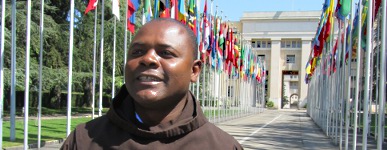Domestic Servitude Panel Discussion
Franciscan's International (FI) co-organised an UN Side Event on Domestic Servitude during the Human Rights Council XV Session in Geneva in September.
The panel discussion aimed to deepen discussions on the grass root causes and the national and international measures in use to combat domestic servitude.
The event, chaired by the UK Ambassador, commenced with a film by Anti-Slavery International (ASI): "Stand with us". Former child domestic workers shared their stories and gave a strong message: Don't stay silent on abuse, make them visible, don't employ underage workers, employments to agreement (pay, hours, tasks, leave, and medical provision training).
ASI presented their national project to protect Domestic Workers' Servitude from human rights violations and invited Mrs. Rubi Lopez to share her personal experience as a domestic worker from the age of five in India and England.
Representing FI, Sr. Nisha FSM from India presented on the work of Franciscans at the national and regional levels.
Mrs Prasad from Global Alliance Against Traffic in Women (GAATW) highlighted the widespread injustice issues of domestic workers employed by diplomats and the proposed solutions.
Mrs. Tomei, a representative for the UN International Labour Office (ILO) shared on how the three year process of setting standards for domestic workers began in March 2008, the conclusions and recommendations were adopted in June 2010 and the importance of clarifying issues to better focus next years discussion. ILO expects all feedback by 18 November 2010.
Mrs. G. Shahinian, the Special Rapporteur on Contemporary Forms of Slavery (CFS), spoke about her role to address the biggest issues affecting the most vulnerable and the processes that happen to try to protect them. The member states are planning to ratify the Convention on migrant workers and family.
The event concluded with advice on how to collect documentation, collecting data on magnitude and characteristics of domestic workers, diplomatic employers, examples of good practice in combined efforts between the country of origin and the country of destination to protect workers' rights, the re-integration of victims, a special fund, and family reunification.




 Franciscans International
Franciscans International